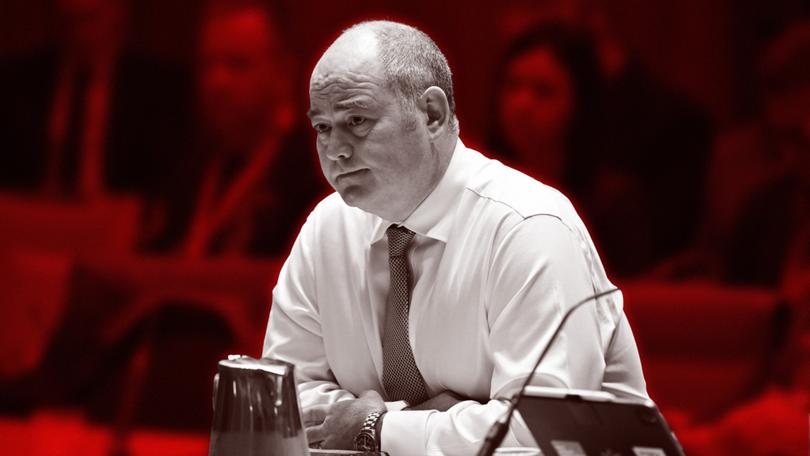New National Australia Bank chief executive Andrew Irvine not content to just be ‘one of the big four’
Australians are ‘grumpy’ at the state of the economy but are ‘doing OK’ and ‘having to work hard’ amid persistent cost-of-living and financial pressures, one of the nation’s biggest bank bosses says.

Australians are “grumpy” at the state of the economy but are “doing OK” but “having to work hard” amid persistent cost-of-living and financial pressures, one of the nation’s biggest bank bosses says.
National Australia Bank boss Andrew Irvine has also warned of major economic and societal implications for Australia if the housing crisis was not fixed, warning the types of homes being built did not allow enough young people to enter the housing market.
He has also flagged an overhaul of how NAB does business, saying he was not content for it to be “just one of the big four”. He wants customers to love the bank as much as they love Toyota and Bunnings, and plans to examine how customer loyalty is rewarded.
Sign up to The Nightly's newsletters.
Get the first look at the digital newspaper, curated daily stories and breaking headlines delivered to your inbox.
By continuing you agree to our Terms and Privacy Policy.Mr Irvine reckons there are some signs that suggested pressure on household budgets should let up next year.
“We’re doing OK. We’re bumping along, but we’re grumpy,” Mr Irvine told The Nightly in a wide-ranging interview. “And we’re not really having fun, but we’re getting by. We’re making ends meet.”
He said there were discrepancies: for example, resource-rich WA and Queensland were doing better than the rest of the country, and he added that for older people who had paid off their home loans, “life is good”.
“But here’s the clincher — everyone’s got a job,” Mr Irvine said.
“Everyone who wants a job has one. If you want a second shift or a second job, you can get one. People are getting by generally, but they’re having to work hard and having to budget fiercely.”

Mr Irvine pointed out there were some positive signs — inflation was moderating and interest rates were likely to start falling early next year despite the stronger-than-expected jobs numbers earlier this month.
“I think we’re at the toughest point in the economic cycle,” he said.
“There’s light at the end of the tunnel ... into (20)25 and then certainly into (20)26 things are going to be better.”
Mr Irvine credited the Reserve Bank of Australia, which has been combating the highest inflation in three decades with rate hikes between mid-2022 and late 2023, with dealing with the situation well
“We’ll see how she goes, but people don’t remember — there’ve been other downturns where unemployment (rate) was in the double-digits and interest rates were 17-18 per cent. So it’s a heck of a lot better than those examples,” he said.
Too few first-home buyers were able to crack into the market in part due to the wrong mix of housing being constructed — and not enough houses, he said.
“We need more tradies,” he said. “Last year we brought in 700,000 new Australians and only 10,000 of them had a trade.
“That’s the wrong mix. We need more tradespeople ... coming to Australia to help build homes, we need to make planning faster and simpler.”
“You can’t talk to a builder who’s not pulling their hair out on just how hard it is, the minutiae, that it’s over-regulated. It’s too hard. In some states taxation is a problem . . . it’s certainly a problem in my State (Victoria).”
Mr Irvine emphasised more action was needed on housing supply than for those that would add to demand, like changes to incentives or helps for prospective first-time buyers because further demand would merely fuel further price growth.
He said too many of the available homes for sale were large homes that were too expensive and inappropriate for particularly first-time buyers.
“We need to really push into what I would call medium-density housing — townhouses, low-rise apartment buildings,” he said. “They’re more affordable, they’re faster to get out of the ground, and that’s what we need in Australia right now so that we have more housing options for young people.
“That’s the thing. You’ve gotta buy your first house before you can buy your second one, maybe a third one.”
Governments of all levels are grappling with ambitious policy targets to meet growing housing needs but a lack of skilled tradespeople and a frequently-criticised hodgepodge of planning laws that critics say are unnecessarily restrictive of new development.
Mr Irvine added he was not trying to dampen people’s aspiration to work hard and “maybe ... get two or three homes over the course of a working life”, but more people needed to be able to get onto the housing ladder.
“I don’t think we’ve got enough of that,” he said, pointing to European cities where predominant or only options were three-to-six-storey buildings, compared to Australia’s predisposition to a detached house with a garden or backyard.
He was clear of the potential cost to Australia if the housing crisis was not properly addressed.
“The lack of housing is actually forcing us to do things that are not good for the country — in terms of moderating migration and it’s impacting the education sector,” Mr Irvine said, referring to Federal Government cuts to skilled migration and international student caps.
“It will impact manufacturing, it will impact agriculture, it will impact extraction and mining. And it’s all because we’ve not got enough accommodation to put these people,” he said.
“So we have to fix this housing issue or it’s going to have material impacts on the rest of the economy.”
NAB in a submission to a parliamentary inquiry on home ownership has suggested lenders be able to ignore HECS-Help debt in mortgage applications, to allow for more people to be successful given the debts are designed to be repaid.
While increasing first homebuyers’ leverage — such as through government incentives — would be “potentially OK”, Mr Irvine warned that if that was the only measure, houses would become more expensive.
Mr Irvine — now six months into the job as chief executive — was speaking as he unveiled a new strategy for the bank, and declared he was not content with NAB merely being one of the country’s “big four” banks. Instead, he plans to increase personal relationships with customers, with the new strategy prioritising “going back to basics”.
He insisted banks could be “awesome” and inspire customer loyalty and affection to the same level as hardware giant Bunnings.
“I think over the last four years, we’ve really improved the bank,” Mr Irvine said. “But if I’m brutally honest . . . I don’t think we’ve differentiated ourselves from the other banks sufficiently yet.
“Australians, colloquially, kind of lump all the banks together with a big four and that’s not what I want for us. I want to have a distinctive relationship with our customers — where we’re not just one of the big four, we’re their bank and we are on their side.”
Mr Irvine in April succeeded Ross McEwan as NAB’s chief executive. A Briton who’s spent much of his career in Canada, he joined NAB about four-and-half years ago as head of its business bank — its core. He wants to bring some of business banking’s special sauce — personal relationships — to the rest of the organisation.
“What I’m trying to do in the refresh is to bring the customer to the centre of everything that we do as a company,” he said.
“I think about my job as we’re in the job of helping people achieve their dreams.”
Dream achieved, Mr Irvine hopes, that customer sticks with NAB for the next few and spread the word about their great experience with the bank. He reckons the perception that loyalty is not rewarded has persisted for too long.
“I want to change that too,” he said.
“That is, we’re in it for the long term with you and actually (that) loyalty and length of relationship is important.
“That’s going to require a lot of work to be known as the place, where ... someone’s in a family and they say, ‘I’m having trouble with my bank’. I want the NAB customer in the family to say ‘you should come to NAB; they’re awesome’.
“I’m really all-in on this, and it’s going to mean we’re going to have to look at who we hire, how we hire, who we train, how we train, because we’re a big company, and we’re going to have to look at every element of our business to improve.”
He acknowledges having Australians recognise their bank as “awesome” is a long-term goal, but counters “banks in other markets have that”.
“Toyota is loved in Australia. Bunnings is often a brand that’s named — Disney, Apple is,” Mr Irvine said.
“Some of those are global brands but I aspire that we’re in that type of company, not the company of just another bank. We’ve got to earn that.”
Bunnings has been named Australia’s most trusted brand twice this year by Roy Morgan, while in NAB’s own category, Bendigo Bank is a three-time winner of the most trusted bank.
Trust in banks has been low for years and the industry’s standing took a battering in the wake of revelations of the Royal Commission into misconduct in the sector, which took two years from the first evidence to the final report. Since then, while goodwill was built up over the treatment of customers during the pandemic, banks have copped it over branch closures.
As a sector, the banks’ counter-customer demands are changing — more people are using digital services and apps than physically using cash. Mr Irvine concedes NAB and others have closed branches but declared: “You’re not going to see me closing branches that are being used.”
“So the only times we really are closing branches is when they’re empty. So, you know, I feel that quite strongly — where we are interacting and having good interactions with customers, those locations will stay open,” he said.
NAB had a 14.4 per cent share of the nation’s home lending market in August, and while it’s primarily known as a business bank, Mr Irvine is interested in increasing its share of mortgages. But he noted it has been challenging over the past year for NAB to make money in home lending.
“That’s something we’re working on — around how we can better provide services to Australians that they value while doing it at a fair return to ourselves,” he said.
